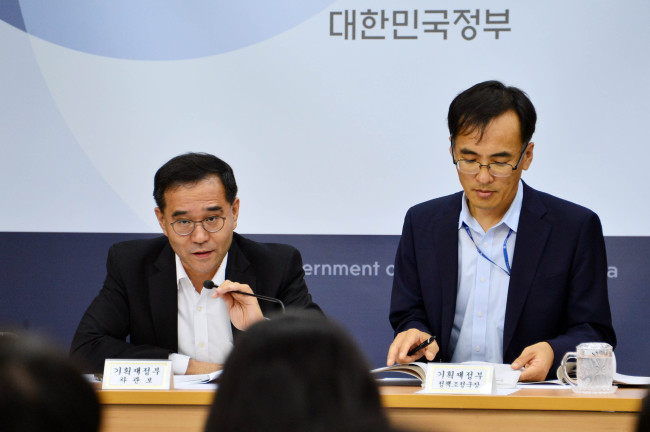[THE INVESTOR] The service industry will be fostered over the next five years as Korea’s new growth engine amid the sluggish manufacturing sector and faltering exports, the government said on July 5.
In an economy-related ministers’ meeting held in Seoul, the government endorsed the plan to give higher tax rewards and research and development incentives to the service sector in a way that transforms the nation’s manufacturing-oriented economy.
In an economy-related ministers’ meeting held in Seoul, the government endorsed the plan to give higher tax rewards and research and development incentives to the service sector in a way that transforms the nation’s manufacturing-oriented economy.

“The manufacturing industry, which has led South Korea‘s economic development in the past, sees its role weakening in terms of economic growth and employment,” Deputy Finance Minister Lee Chan-woo said in a media briefing.
“Now we have to bolster the fast-growing service industry in a bid to seek a new growth engine and increase the country’s job-creating capability.”
Asia’s fourth-largest economy seems to have entered a downside cycle as its growth rate has remained around 2-3 percent over the past few years, compared with some 4-5 percent growth in the 2000s.
Its exports, the key economic driver, have posted a record 18th month consecutive drop since the first month of last year amid waning global demand.
As a result, South Korea’s manufacturing sector, directly affected by exports, accounts for nearly 30 percent of the country‘s gross domestic product during the 2010-2015 period. But its employment rate hovers around 17 percent in recent years, lagging far behind its GDP contribution.
The service industry, on the other hand, has been strengthening its presence in the economy, hiring 70 percent of the country’s total workforce in 2015.
But it accounted for 60 percent of the country‘s total added value, due to poor labor productivity in the service sector.
“The plan is aimed at creating a service-oriented industry, promoting the service-manufacturing convergence and supporting potential sectors,” said Lee. “We expect it will create an additional 250,000 new jobs in the service sector by 2020.”
The government said it will upgrade the service industry’s labor productivity, currently amounting to US$47,000 per person, to $58,600, the average level of the Organization for Economic Cooperation and Development, by 2020, by giving higher tax breaks and lifting unnecessary regulations.
Under the latest plan, the government will revise the current tax codes that give preferential treatment to exporting manufacturing companies and grant service firms equal tax benefits in accordance with the number of employees and research and development projects.
State-run policy lenders, like the Korea Development Bank, will expand their support fund for the service industry to 54 trillion won (US$47 billion) by 2020 from 39 trillion won in 2015.
The government will remove legal and administrative barriers to help seven selected service sectors, including medical, contents, finance and logistics, expand their business in areas like telemedicine services, internet-only banks and drone delivery services, according to the Finance Ministry.
(theinvestor@heraldcorp.com)











![[Bridge to Africa] S. Korea-to-Zimbabwe value chains can foster ‘win-win’ cooperation](http://res.heraldm.com/phpwas/restmb_idxmake.php?idx=644&simg=/content/image/2024/05/14/20240514050881_0.jpg&u=20240515223025)






